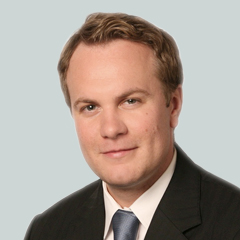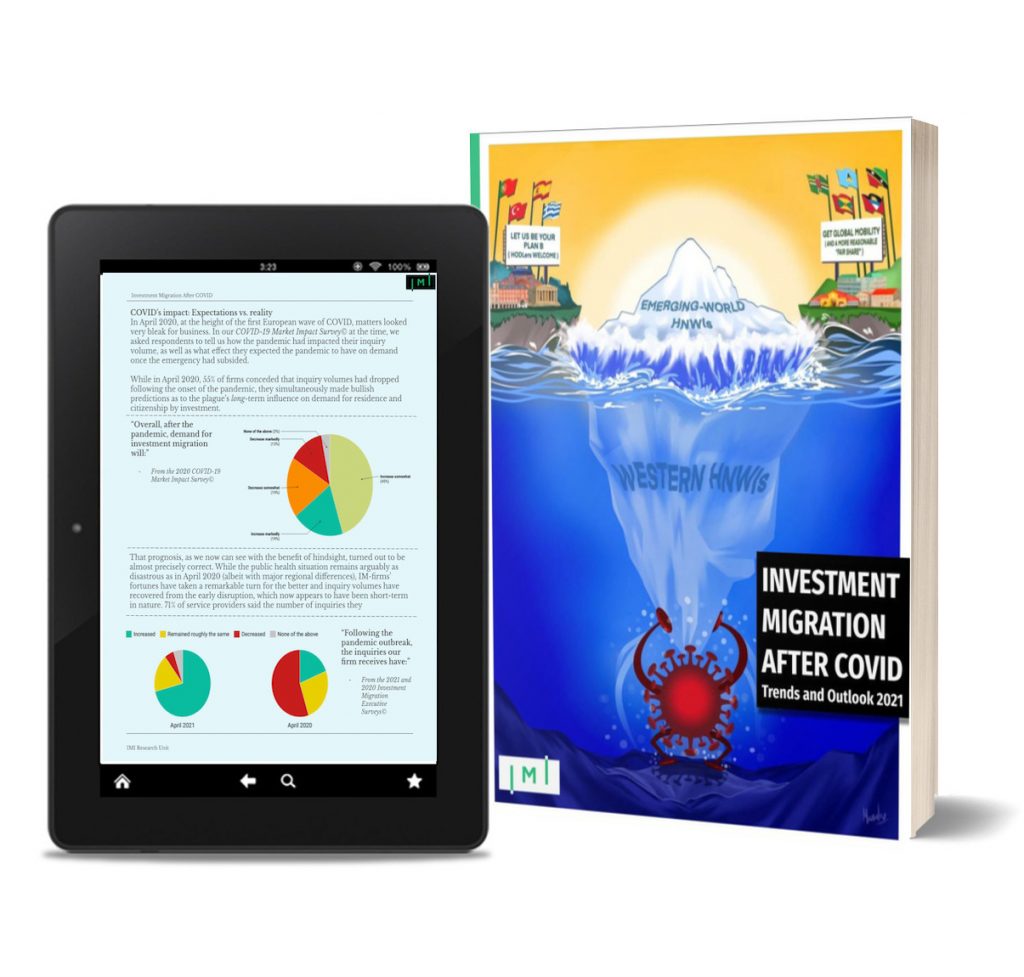Special: 9 Industry Leaders on How COVID Changed the IM Market
In connection with preparing the Investment Migration After COVID report, we asked a selection of leading industry executives – whose companies operate in varied markets and offer a wide portfolio of programs – one simple question that would help us identify the principal effects the pandemic has had on the investment migration market:
“Please tell us, in 100 words or fewer, what you consider the most significant difference between the IM market in 2019 and the IM market in 2021?”
What follows are their respective answers to that question, along with links to further reading on the themes each broached.

Jean-Francois Harvey – Global Managing Partner, Harvey Law Group
The trend we’ve seen in the last two or three quarters is that there is no more trend, destination-wise. The market is getting very well educated in most part of the world and there is so much information now available. The result is what we see increasingly; clients coming to us with a very precise idea of what they need. Their research is no longer about the choice of program but about finding a well-experienced firm that is knowledgeable and liable, legally speaking. Destination-wise, we’ve never seen such a variety of requests in almost 30 years.

Eric G. Major – CEO, Latitude – Residency & Citizenship Solutions
I can do so in three letters: USA. It’s now our largest source market. Period.

Stefan Kraus – COO, Henley & Partners
The investment migration market today is far more diverse. In the past, the constant stream of inquiries from citizens of emerging economies and politically precarious states was somewhat predictable, but the game-changer has been the exponential spike in interest from nationals of highly developed countries — and in particular Australia, Canada, the UK, and the US — that now generate the same level of interest, if not more. Necessity has seen the industry prevail, and investment migration is now accepted as a mainstream advisory service for high-net-worth individuals, international investors, and entrepreneurs.

Mohammed Asaria – Founder of Range Developments
There is a greater impetus to execute. Anxieties around political, social, and economic challenges remain elevated. Combining this with the threat of higher taxes, some of which being mooted are citizenship-based, investors have accepted that this is not the time for window shopping; if the CBI solution makes sense then time is of the essence given the macroeconomic background. Dependent on the nationality of the investor, ensuring a perfect hedge may require the original citizenship to be relinquished. Discerning investors are gravitating towards CBI programs with higher due diligence standards as this will ensure the long-term viability of their selected CBI strategy.
Dig deeper:
From Flag Theory to Flag Practice: Time to Execute That Plan B
Six Signs an Investment Migration Program’s Due Diligence Process is Not Good Enough
Citizenship-Based Taxation: 3 Signs Europe Might Follow in The US’ Footsteps
Record Numbers of Americans Renouncing Citizenships Has Nothing to Do With The Pandemic

Micha-Rose Emmett – CEO, CS Global Partners
In 2021, we are seeing a new breed of investor emerge: Wealthy entrepreneurs from developed countries have become increasingly worried, as large governments start to put further restrictions on them. The reasons for wanting to invest in dual citizenship have also shifted to more practical ones such as healthcare and stable governance. The pandemic has unveiled the weaknesses of certain governments who are now penalising the wealthy as a means for funding and, as a result, investors are looking to countries where they will be welcomed. Pre-pandemic, most viewed having more than one citizenship as a nice-to-have. Post-covid, it has become a vital insurance policy.

Nicholas Stevens – Managing Director, NTL Trust
Clients now understand that citizenship and residence planning is not so much about counting visa-free countries but more about developing a serious and resilient Plan B to cover personal security, business and asset protection, fiscal planning, and mobility – all together – and that holding multiple citizenships and residencies will be essential for any successful family in the future.

David Lesperance – Managing Partner, Lesperance & Associates
In the last two years, the importance of the quality of your Backup Plan has become painfully obvious. Whether disappearing like Jack Ma; being subject to major pending Tax the Rich policies in the US, UK, EU or Latin America; or pending major leadership changes in places like Saudi Arabia.
The quality of your shelter only shows after tested by a tsunami.

Paul Williams – CEO, La Vida Europe
One of the biggest shifts we’ve seen is in the desire of clients for a second home, living there either part-time or full time. We analysed the reasons from enquiries on our website in the 12 months prior to 31st March 2020 and the 12 months after, published here. Both of these saw a significant shift upwards with full-time living rising 22.9% to 27.0% and part-time 26.1% to 34.3%. We expect this reflects changing attitudes pre and post Covid.

Sam Bayat – Founder, Bayat Legal Services
The most significant change is that we won’t be taking things for granted anymore and must all learn to respond sooner to events (global or local). We now have essentially two main groups; the ones who are now more committed to fully embracing business and life, and therefore want alternative citizenships, golden visas, etc to not miss any opportunity, and on the other hand we have a smaller group who want to relive the Covid-19 area perpetually as working from home, time with family, and no business travel was… peaceful.
In the Investment Migration After COVID report, you can see the complete results of the 2021 Investment Migration Executive Survey, get an overview of which programs have been the relative winners and losers of the pandemic year, and learn how dozens of the leading executives in the investment migration market believe the market has, and will, change as a consequence of COVID.

The report attempts to identify the most consequential transformations that have taken place in the investment migration market over the last year, to prognosticate as to which marks 2020 will leave on the market in the long run, and to outline how industry professionals can prosper in the new investment migration market.
Investment Migration After COVID – Trends and Outlook 2021
Investment Migration After COVID tells the story of what we expected to happen after the pandemic, compares that to what happened, and highlights what dozens of leading investment migration executives anticipate will change in the years ahead.
- Findings of the April 2021 Investment Migration Executive Survey©
- How pandemic-related government restrictions have affected the service deliverability;
- How the pandemic has affected demand;
- Which source markets are growing the fastest;
- How client’s preferences have changed as a consequence of the pandemic,
- In which regions IM companies are planning to open new offices;
- Which programs have risen and fallen the most in popularity over the last year;
- Which programs were the best-sellers in the last year, and which are expected to be the best-sellers in the next year; and
- Which application processing units were the most efficient in 2020.
- How companies have adapted to new work habits necessitated by the pandemic, such as working remotely, reducing travel and in-person event attendance, and the degree to which such changes are likely to persist in the long term.
- A review of the April 2020 COVID Market Impact Survey©
- How IM executives expected the pandemic to impact demand compared to what actually happened;
- How demand has changed between April 2020 and April 2021; and
- What IM executives expected to happen with border restrictions compared to what actually happened.
- An interview with Nestor Alfred of the Saint Lucia CIU
- How did the Unit change its policies to go from being a laggard to being the most efficient CIU, according to IM executives?
- The mega-trends driving the transformation of the IM market after COVID
- The West wakes up to investment migration;
- Crypto-millionaires: The new new rich;
- The race to digitize and remote-enable program processing;
- Beyond visa-free travel;
- How major investment migration programs performed in 2020
- The winners and losers of the pandemic.
- The biggest differences between the IM market before and after COVID, according to industry leaders
- Stefan Kraus, COO of Henley & Partners;
- Jean-François Harvey, Global Managing Director of Harvey Law Group;
- Eric G. Major, CEO of Latitude;
- Mohammed Asaria, Founder of Range Developments;
- Micha-Rose Emmett, CEO of CS Global Partners;
- Nicholas Stevens, Managing Director of NTL Trust;
- David Lesperance, Managing Partner of Lesperance & Associates;
- Paul Williams, CEO of La Vida Europe; and
- Sam Bayat, Founder of Bayat Legal Services.
IMI Club Pro Members:
FREE
IMI Club Members:
FREE
Christian Henrik Nesheim is the founder and editor of Investment Migration Insider, the #1 magazine – online or offline – for residency and citizenship by investment. He is an internationally recognized expert, speaker, documentary producer, and writer on the subject of investment migration, whose work is cited in the Economist, Bloomberg, Fortune, Forbes, Newsweek, and Business Insider. Norwegian by birth, Christian has spent the last 16 years in the United States, China, Spain, and Portugal.


